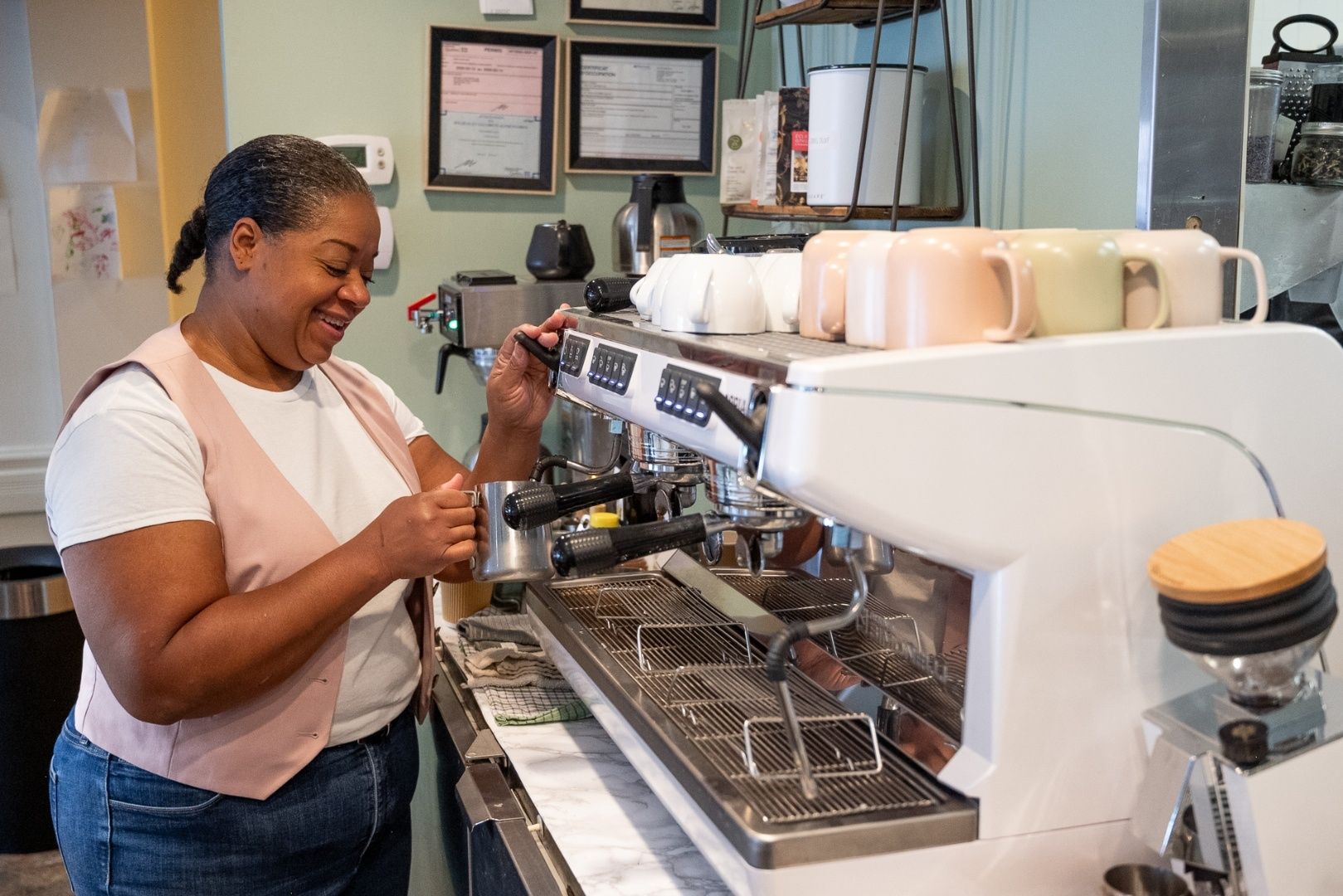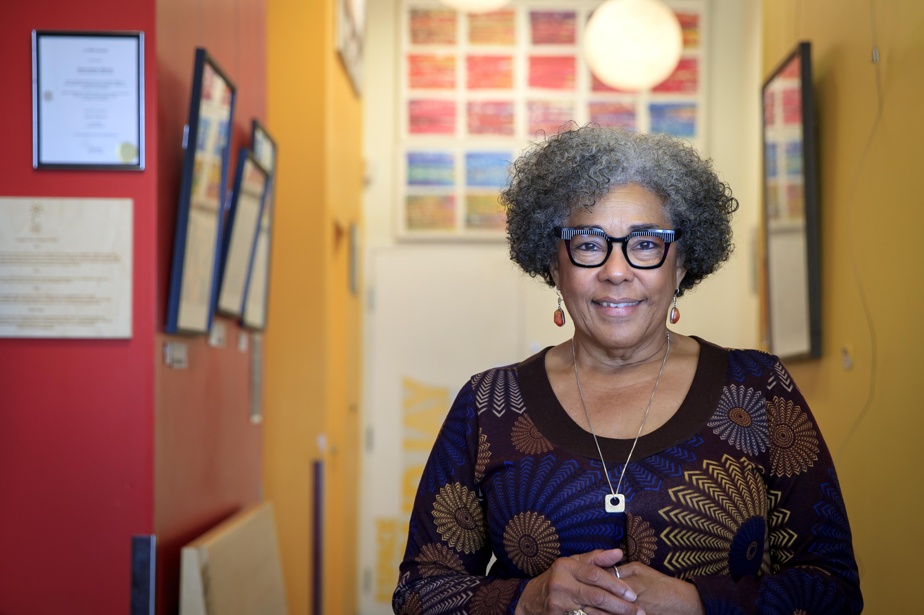If you have your morning coffee in Plaza St-Hubert, you may be passing by the Café Latino Communautaire. In addition to being a welcoming place, the establishment has the particularity of counting newcomers and asylum seekers among its employees. They can work there in exchange for food donations, distributed to those in need.
Created to help vulnerable people, the Café Latino Communautaire provides meals and food baskets based on individual incomes. Whether in the kitchen or as a barista, the employees of the café make the atmosphere friendly and warm. Among its volunteer employees, we find Nathalia. Arriving in Canada in October 2019, she explains that she left her native country, Colombia, in order to temporarily flee the social problems that plague there.
“Our intention has always been to return to Colombia,” explains this mother. She says that, a few months after her arrival, when she and her family were preparing to return to the country, her mother was visited by an armed group. “We couldn't come back, for nothing in the world,” she describes, shaken. So we made the decision to seek asylum.”
For her immediate family, which also includes her husband and her 15-year-old daughter, the asylum process was long and stressful. “We had a court date — it's coming soon — but it's almost two years after we applied,” says Nathalia. “We were fortunate because, as we had a work permit for studies, my husband and I were able to start working. while waiting for our hearing. This has not been the case for others,” she laments.
Administrative ping pong, ban on use
What Nathalia is pointing out is a problem that affects a lot of asylum seekers in Canada. This is the case of Esmeralda, who arrived in Quebec in August 2022, who has been waiting for more than eight months for a response to her asylum request. Originally from Mexico, the 33-year-old woman explains that she fell into an administrative fog where information is poorly shared. “My status prevents me from working, I cannot enroll in francization courses. My lawyer did not know how to properly handle my case for me and my 13-year-old son,” says Esméralda, frustrated by the situation she is in. She adds that the biggest problem with asylum applications is the lack of information that newcomers face.
“If there was a place where all the necessary information about immigration and asylum was gathered, it would be easier. We wouldn't have to run around, we wouldn't get sent back everywhere and everywhere,” she continues. “They send us to places without really answering our questions. I go back and forth to the immigration offices, to the hospital, to my lawyer,” adds the woman, who is still waiting for an answer about her status and that of her son.
Deprived of a work permit due to her current situation, Esmeralda underlines how precarious the daily life of asylum seekers can be. “Many people think that newcomers are coming for social assistance, but that is far from being the case...” she begins. “I was told several times not to worry, because I was going to receive monetary aid. I don't want help, I want a work permit, I want to start doing things right,” she adds in a firm tone.
For many people in a similar situation, the assistance given to asylum seekers without a work permit is extremely meager. “It doesn't allow me to pay rent, monthly expenses, bus cards,” she said.
“This small market is a blessing for everyone who comes and works there.”

Alexander has been in Montreal for about four months. For him, Canada represents the end of a long and perilous journey. He is currently waiting for a response to his refugee claim, as his hearing date has been set for January 2024. After having passed through numerous countries from his country of departure, Colombia, he bitterly recounts the dark adventures he experienced.
“During my trip from there to here, I was kidnapped for five days in Mexico by the Sinaloa cartel. They extorted $4,000 in exchange for the safety of my son, which they wanted to keep,” says the father, shaken by this episode. “I gave them all the money I had saved for Canada,” he adds, who was out of date. It was horrible. I don't want that on anyone.”
Things take a different turn for Alexander once he is back in Canada. “I got my work permit while waiting for my hearing, but it turns out they got my birth date wrong on my papers,” he says. I am trying to resolve the situation with the social security office, but no one seems to have any answers to my questions.” Frustrated, he finds himself in the middle of an administrative mess that reduces his ability to integrate.
“This small market is a blessing for everyone who comes and works there,” says Esmeralda. While the biggest problem is the lack of information and resources, as everyone present reiterated, coffee is a place for newcomers from around the world to gather and share, but especially for Spanish speakers.
Irlanda Espinoza created the Alliance of Mexican Businesses in Montreal (ACOMM) eight years ago, and she has recently devoted her time to the Café Latino Comunitario, where she delivers food and hygiene baskets at reduced prices. Originally from Mexico, Irlanda settled in Canada 23 years ago. She said she had difficulty finding help distributing food, but now she can count on 80 volunteers, most of them asylum seekers. These volunteers do not have to pay for the baskets, which cost $7 for citizens who sign up for the café.
Very vulnerable situations

Since working at the Café Latino Communautaire, Irlanda has seen firsthand the increase in the number of asylum seekers registered in Canada, especially in Quebec. The community manager has seen a lot of immigrants of Latin American origin arrive since 2017. “They are a lot of Colombians and Mexicans with study permits, and then we saw a lot of Venezuelans arrive. There are also Guatemalans who came as temporary foreign workers.”
According to Ms. Espinoza, the COVID-19 pandemic has also played an important role. It was around this time that the community organizer began to notice that a larger clientele needed the food bank. Even many seasonal workers started to turn to food aid because, she says, many fled the farms that employed them after being abused.
Recall that in 2022, nearly 40,000 asylum seekers crossed the border via Roxham Road, according to federal data. Irlanda has felt the effects of this increase, not only on asylum seeker support agencies like the PRAIDA, but also in his own café. “The biggest problem we've seen is that these people don't get appointments for their hearing, they don't have a work permit, and that places them in very vulnerable situations, like working under the table, for example. These people have no money and only survive on social assistance, which is barely enough to pay rent and some expenses.”
In fact, many of those who come to the Café Latino Comunitario for help end up volunteering there, including helping to distribute cheap food baskets. “They tell themselves that because they can't work or study, they will volunteer. That way, they will have access to food baskets and at least have something to eat at home,” she says.
“If the person comes and tells us that they don't have anything to eat, we also help them to eat.” The Café is in fact responsible for distributing 600 baskets per week, and asylum seekers are the key to this work, as the organization only has 10 employees.
Discrimination and lack of information
Irlanda adds that the inability to work is not the only problem asylum seekers face. She says that many of them shared their experiences looking for housing and that discrimination is an integral part of the process. “They told me that they were having trouble renting an apartment because they had children. Most asylum seekers come from families and have children,” she said, baffled.
Added to these difficulties are the language barrier and the lack of information. “They have difficulties because of the language, they cannot be understood and they cannot find an apartment because they have children. Then, if they have no work, no food, no opportunity to send their children to school, they become depressed. I know that among them the rates of depression are very high. Asylum seekers are in a very precarious situation.”
Despite the closure of irregular immigration routes, Café Latino Comunitario continues to receive large numbers of asylum seekers looking for help. That is why Irlanda is demanding more support from the federal and provincial governments.
“The administrative machine remains very slow”
Emmanuel Roy is an immigration lawyer. Located in Montreal, his office noted that the number of asylum seekers had increased since 2017, especially in 2022.
According to Mr. Roy, despite the recent closure of Roxham Road and the fact that there have not been many arrivals of asylum seekers in recent weeks, “the administrative machine is still very slow.” “I would even say that it is collapsing, because many are still waiting for their hearing and work permits,” he explains.
Those who are in the process receive very distant interview dates, in cases where all the necessary documents are sent in an expedited manner. “The interview is scheduled months later, which is still a long time, because during this time they do not have a work permit.”
The lawyer explains that asylum seekers receive an acknowledgement of receipt that confirms their asylum status. They thus have access to medical services, but this is not always the case. “Even with such an acknowledgement of receipt, they cannot work,” he adds. Mr. Roy acknowledges that many asylum seekers have no choice but to work under the table. “It's something we don't recommend, but it's what happens in many cases.”
Added to this reality of immigration system delays is the strike by public sector employees, which began on 19 April and affects some 155,000 workers. This strike will likely have an impact on the situation of asylum seekers who are waiting for a response from the government.
“We are worried that the situation is going to get worse. We are in total uncertainty.” The lawyer admits that, faced with the harsh reality that asylum seekers experience, he often does not know how best to support them. “They ask us to give them an idea of the length of their procedure, but we cannot give it to them,” laments the lawyer, disconcerted.
La Converse tried to get answers from the Ministry of Immigration, Refugees and Citizenship to the allegations made by the people involved in this report, but at the time of writing, no response had yet been provided.
In this administrative fog that asylum seekers must go through across Canada, the Latin Community Café improves access to information through the use of the community, while making it possible to alleviate the various problems that these people experience. In the meantime, people like Nathalia, Esméralda and Alexander benefit from the services of the café. “We would like there to be a place that gathers all the information, instead of having to run from one place to another. Fortunately, we have this coffee that helps us a lot,” Nathalia finishes. Irlanda, always happy to contribute to such a project, recalls that it is necessary for a change to take place at the administrative level in order for the situation of asylum seekers to stop being so painful.





.jpg)
.jpeg)

.jpg)

